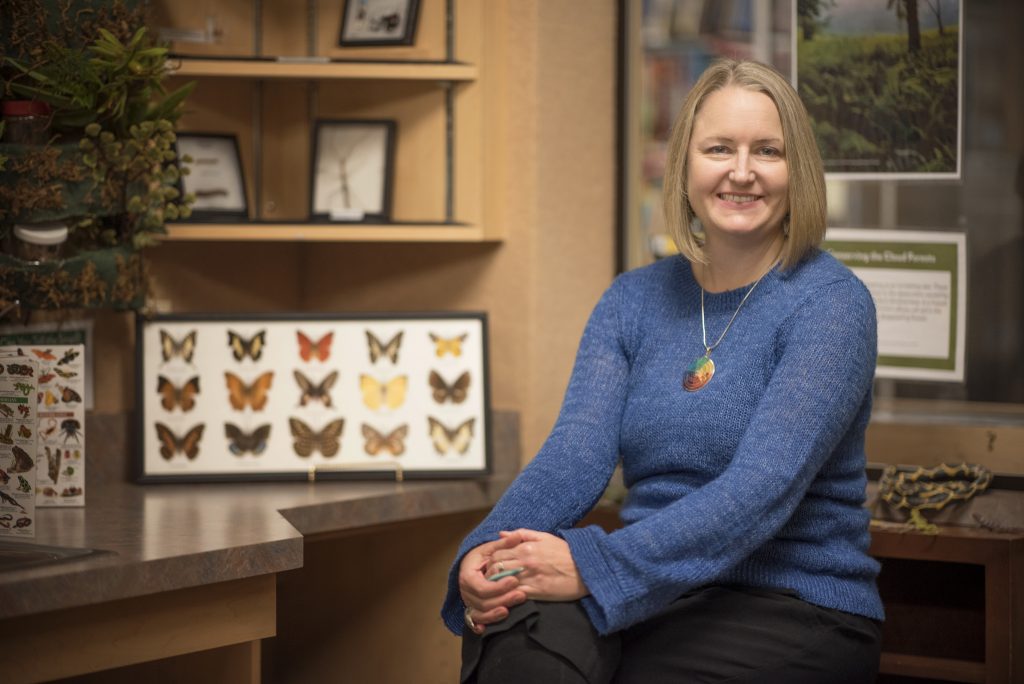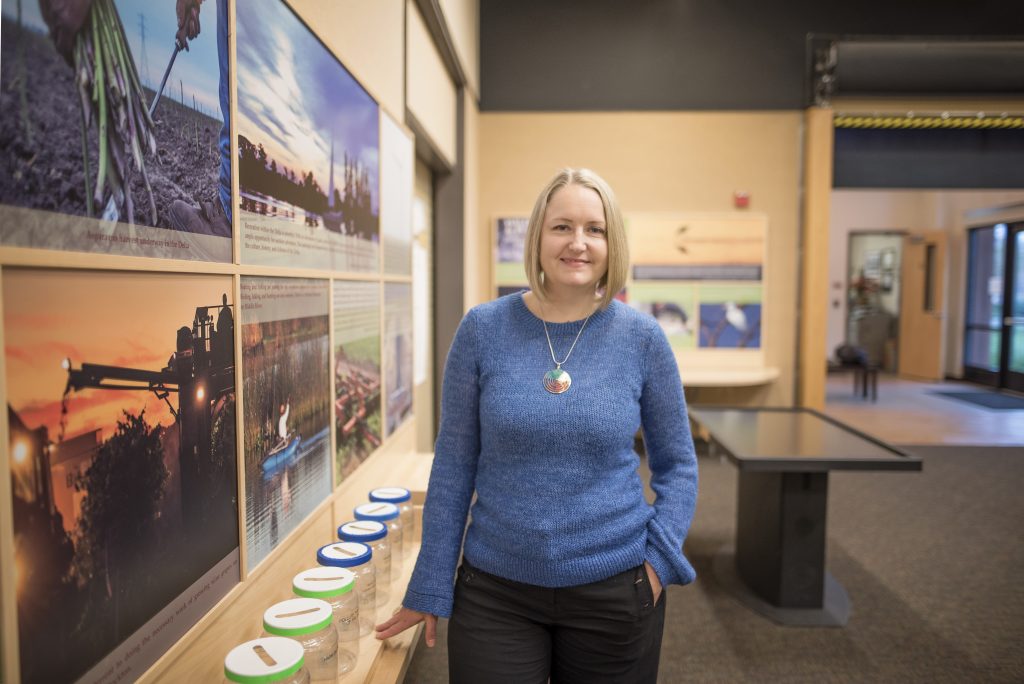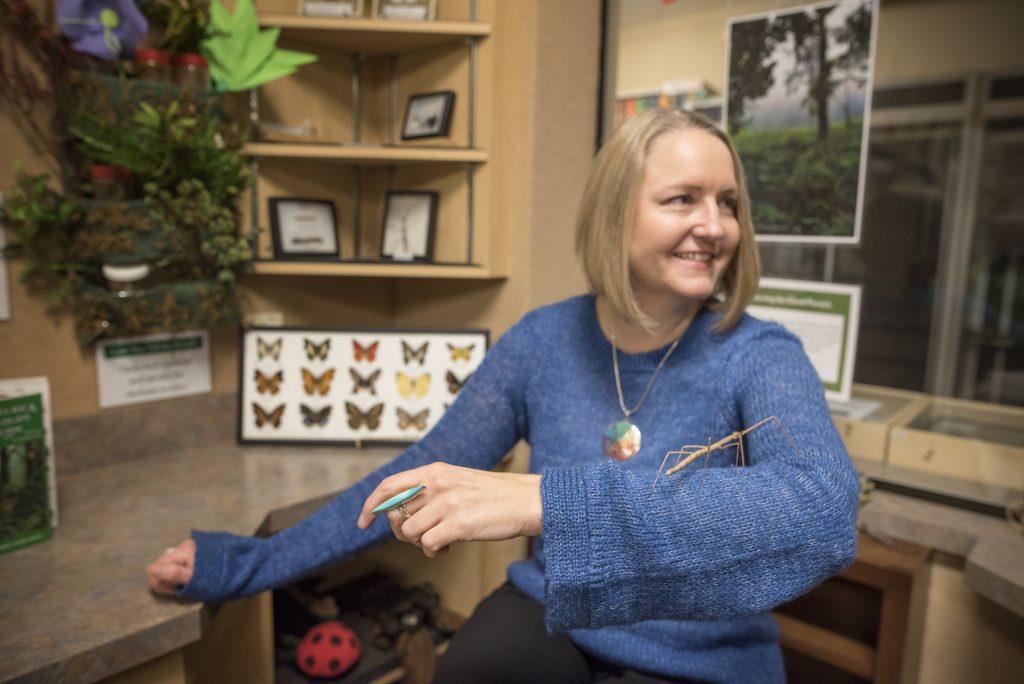From National Parks to the North State: New Gateway Director Looks to Showcase Natural World Around Us

It’s fair to say that Adrienne McGraw probably grew up with a cooler backyard than all of us.
Her father, a longtime ranger for the National Park Service, worked in picturesque places like Kings Canyon National Park, Navajo National Monument, and Grand Canyon National Park. McGraw’s homes sat inside the beautiful boundaries of these stunning natural wonders.
She often tagged along as her father led tours, listening and learning about the environments that regularly attract international visitors.
“Here he is in this adorable ranger outfit, and he’s my dad,” McGraw said, glowing with admiration. “He’s helping to educate the people who come to the place where I live, and I get to call this home.”
McGraw can easily draw a line from those early days traversing trails with national park guests to her work today, as an advocate of science with the heart of a teacher. She’s combined these traits to become the new executive director of Chico State’s Gateway Science Museum.
Since 2010, Gateway has provided science education and interactive experiences to the North State, specializing in exhibits geared toward children from kindergarten through 12th grade. These exhibits have ranged in topics from bats and bears to sustainability and modern farming practices.
Gateway’s newest exhibit, “Brain: The World Inside Your Head,” is on display through May 6.
Growing up, McGraw developed a keen sense of protecting the natural environments around her homes because she recognized and appreciated that their importance extended far beyond the human race.

“If you live in these spaces and you see people coming in and littering or not respecting them, you have this other sense of ownership, like, ‘This is where we live, this is where I live, and this is also where the deer, raccoons, squirrels, and the bears live. Don’t trash it,’” McGraw said. “And I wanted them to draw joy and inspiration from it like we do.”
Her future in education and beyond was shaped through those early experiences. She went on to earn a bachelor’s degree from Fresno State in environmental studies, a master’s degree from Cal State East Bay in environmental education, and another master’s degree in museum studies from John F. Kennedy University. She also taught in the museum studies graduate program at JFK University from 2010–2013, and served as its chair from 2013–2017.
From 2008 to 2013, she also worked as executive director of Exhibit Envoy, an organization that delivers traveling exhibits to and from museums—including Gateway. During her tenure at Exhibit Envoy, she was personally involved in developing 18 exhibits, including Delta Grandeur (an exhibit that has been in Gateway’s Newberry Gallery since January 2017 and will run through May 2018). The most effective exhibits, she said, are highly interactive and present complex ideas in a way that anyone can understand.
McGraw’s Exhibit Envoy experience, combined with her strategic planning strengths, was more than enough to convince David Hassenzahl, dean of the College of Natural Sciences, to select her to direct the museum.

“A highly regarded member of the statewide museum community, Adrienne brings a vision for the museum that will build on its already excellent role providing critical outreach for the College of Natural Sciences and the University,” he said.
One challenge McGraw looks forward to addressing is Gateway’s role as a scientific authority in the North State. She envisions a museum that’s at once a venue for science and understanding how we perceive the world, as well as a place where one can have a conversation about it.
To really move the needle of understanding, McGraw said, we need to “have conversations at levels from tiny tots all the way up to adults, and really make those messages appropriate for the age group, have a wide variety of ways of accessing that information, and engage with that information—whether it’s through exhibits or programs or town halls or community events.”
McGraw looks forward to exploring the big picture that science museums can play in communities. For example, they’re an ideal place to address important topics, but how far should that conversation go? Science museums, she says, are at a point where they must choose if they’ll be places of neutral conversation or if they’re going to engage more in advocacy and dialogue.
Personally, McGraw thinks museums should be asking tough questions that encourage self-examination and how we approach topics such as climate change.
“Each of us has to look at our own actions, who we vote for, and what we value as a society. Museums can help us understand the issues, raise awareness, and push the conversations,” McGraw said.
With an average of 18,000 Gateway visitors every year, she thinks the museum is taking the right approach, yet, perhaps by pushing the envelope just a little further, it can drive even more traffic.
“If our numbers are still correct, more people attend museums than they do sporting events. Museums are definitely part of leisure activities, part of educational activities,” McGraw said. “They’re, of course, underfunded and in some ways undersupported within their communities in terms of their soft power. But they’re growing. The more we can support smaller institutions, like Gateway, they help make their communities richer.”
When McGraw explains the importance of science, she’s vocal, excited, and curious, with an ear to the ground. In a sense, she’s still that little girl (only a bit older and wiser) traipsing happily through trails with her ear turned directly to the natural world around her.
“Science is one of the ways that we understand our world, our place in it, and what our impact is,” she said. “But so is just having joy and wonder and having a sense of exploration and discovery. Science and nature studies give us that. All of those venues are avenues for accessing our world.”


